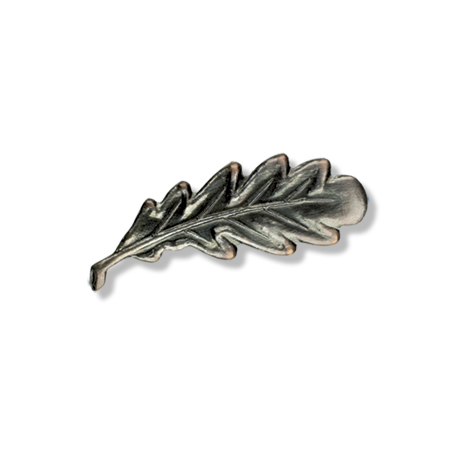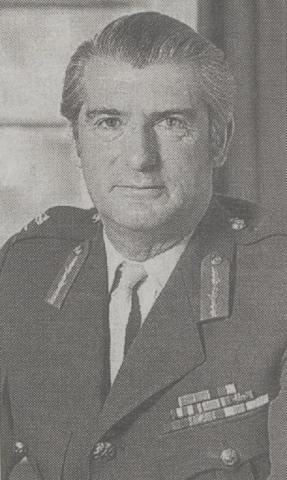Major General John David Carew Graham was CO of 1 PARA from 1964 to 1966 and later helped organise a coup d'etat in Oman.
He was born on January 18, 1923 in Chatham, Kent and educated at Holmwood House, Fernden School and Cheltenham College. From 1940-1941 he served in the Home Guard with the 19th (West Wight) Battalion of the Royal Hampshire Regiment. He subsequently enlisted into the Argyll and Sutherland Highlanders as a Private in August 1941 with the 70th (Young Soldiers') Battalion. This Battalion was disbanded in 1942. He was then commissioned as a 2nd Lieutenant in 1942 and took part in the invasion of Normandy in 1944 with the 2nd Battalion, ASH.
He was wounded in March 1945 during the Rhine Crossing, but returned to the ASH to police the British zone in occupied Germany. He transferred to the 1st Battalion, ASH as a company commander and went to Palestine with them. He joined the 6th Airborne Division in early 1947, and was subsequently seconded to the 5th (Scottish) Parachute Battalion in the BAOR, but this stint was interrupted by the Berlin blockade.
From 1948 to 1952, Graham was seconded for duties with the Foreign Office in the UK and Czechoslovakia, learning Czech at the School of Slavonic Studies in London. He served for a year at the British embassy in Prague before moving to GCHQ in England. As part of the Security Service he was not allowed to serve with the Argylls in the Korean War, so he rejoined the ASH as their Adjutant in late 1952. He also attended the presentation of new Colours by the Queen to the Highlanders on June 26, 1953. Graham graduated from the Staff College, Camberley in 1955 and was a Staff Officer at HQ, Scottish Command from 1956 to 58.
In 1958, Graham rejoined the 1st Battalion of the ASH as a Company Commander, serving in Cyprus. He took a job in 1960 at NATO's headquarters in Fontainebleau, France, as military assistant to the CINCENT (C-in-C, central Europe). A stint at the Combined Staff College stationed in Latimer, Buckinghamshire, followed in 1962. In 1963, Graham joined the 2nd Battalion, the Parachute Regiment as their 2nd in Command at HQ in Bahrain, as tensions in the Radfan and Aden area began to mount.
Graham commanded 1 PARA from 1964 to 66, during a period in which exchanges with the 'Red Wolves' in the Radfan Hills led to at least two of his men being killed. He became an OBE in 1967. He was appointed as an instructor in the Staff College, Camberley on January, 15, 1967 until January 1969, and then became Regimental Colonel of the Parachute Regiment at RHQ. Now a Brigadier, he was seconded to Oman where he took command of the Sultan's armed forces from 1970 to 72.
Here, Graham helped organise a coup in alignment with British foreign policy, a contribution which he considered the highlight of his career. Although the British government were supportive of the Sultanate in Oman, their current Sultan, Said bin Tamur, had become paranoid and repressive. His failure to govern the country left it with only 10 kilometres of paved roads and an open rebellion in the southern province of Dhofar, whilst he refused to spend his substantial oil revenues to solve the crisis. However, the Vice Chief of the General Staff had stated that criticism of Said was to be "hammered" and the general view in the MOD was that the rebellion would "just fizzle out". Despite this, those familiar with the situation now realised Said was incompetent and his country would soon be overthrown. Meanwhile his son, Qaboos, had been trained at Sandhurst and spent a year with the British Army. He was now viewed as the only man who could defeat the Communist rebels. Graham, as commander of the Sultan's armed forces, held a critical role in installing him.
On July 23, 1970, the operation to replace Said bin Tamur finally commenced. Graham gathered the Arab commanders of Oman's desert regiment and informed them that Qaboos had "commanded" British officers to depose his father. His framing of the British as mere servants of the young Sultan convinced the commanders that they were acting in Oman's interests. An entirely peaceful overthrow followed, thanks in part to the palace's guardsmen being stood down beforehand. Said managed to shoot a plotter, as well as himself in the foot by accident, but thankfully nobody was killed. The old Sultan was consigned to a suite in the Dorchester in London for the remaining two years of his life. It was an ironic end for a man who had been both granted power, and stripped of it, by the British.
His son Qaboos immediately set about modernising the country, and the coup was later described as the turning point in the Dhofar War, in which Britain's major goal was to prevent Communist rebels taking control of Oman. It ended in 1976 with the defeat of the Communist-backed Dhofar Liberation Front. Scholar and CO of 2 Para David Benest opined: "John Graham set the scene for what remains the most successful counterinsurgency in modern history, the ‘Arab Spring’ in Oman that pre-dated current awakenings by some forty years — no small achievement". Graham was awarded the Order of Oman in 1972.
After Oman, Graham attended Course 13 at the National Defence College, New Delhi, in 1973. He was also appointed a CBE in the same year. From 1974 to 76 he was the Assistant Chief of Staff back at HQ, Allied Forces Central Europe in Brunssum, Holland.
Graham's subsequent promotion to Major General in 1976 came at the same time he was made GOC Wales. He retired from the Active List in April 1978, having reached the age limit, and was made a Companion of the Order of Bath at the same time. He then became an administrator at Chevening house until 1986, where he helped to look after a number of Foreign Secretaries who are granted residence there. He was re-employed at the HQ of the Parachute Regiment and Airborne Forces, Aldershot from 1988-91. Finally, in 1991 he bought a house in Christ Church, Barbados and resettled there.
He had married Rosemary Adamson in 1956. He died on December 14, 2012, aged 89, survived by his son, wife and daughter.
Compiled with information from:
Daily Telegraph Obituary, 10/01/2013
Airborne Assault Archive (Box 2 C3 27.1.48.)
'Ponder Anew: Brigadier John Graham & The Dhofar War', The Strategy Bridge, article by David Benest: https://thestrategybridge.org/the-bridge/2016/1/1/ponder-anew-brigadier-john-graham-the-dhofar-war-19701972
London Gazette
Article written by Alex Walker
Read More


Latest Comments
There are currently no comments for this content.
Add Comment
In order to add comments you must be registered with ParaData.
If you are currently a ParaData member please login.
If you are not currently a ParaData member but wish to get involved please register.